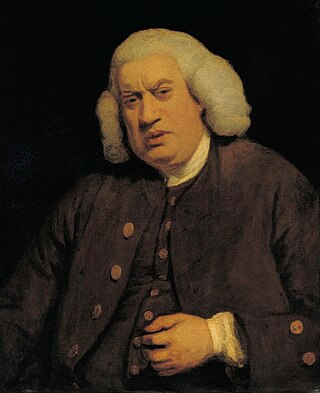
Samuel Johnson, often called Dr Johnson, was an English writer who made lasting contributions as a poet, playwright, essayist, moralist, literary critic, sermonist, biographer, editor, and lexicographer. The Oxford Dictionary of National Biography calls him "arguably the most distinguished man of letters in English history".

Abraham de Moivre FRS was a French mathematician known for de Moivre's formula, a formula that links complex numbers and trigonometry, and for his work on the normal distribution and probability theory.
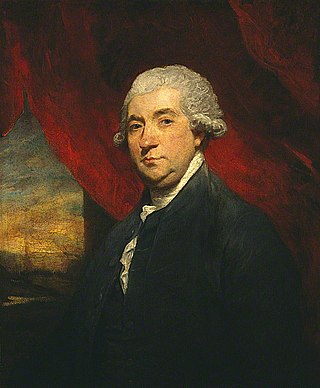
James Boswell, 9th Laird of Auchinleck, was a Scottish biographer, diarist, and lawyer, born in Edinburgh. He is best known for his biography of the English writer Samuel Johnson, Life of Samuel Johnson, which is commonly said to be the greatest biography written in the English language. A great mass of Boswell's diaries, letters, and private papers were recovered from the 1920s to the 1950s, and their publication by Yale University has transformed his reputation.

Thomas Gataker was an English clergyman and theologian.

Hester Lynch Thrale Piozzi was a Welsh writer and socialite who was an important source on Samuel Johnson and 18th-century British life. She belonged to the prominent Salusbury family of Anglo-Welsh landowners, and married firstly a wealthy brewer, Henry Thrale, with whom she had 12 children, then a music teacher, Gabriel Mario Piozzi. Her Anecdotes of the Late Samuel Johnson (1786) and her diary Thraliana, published posthumously in 1942, are the main works for which she is remembered. She also wrote a popular history book, a travel book, and a dictionary. She has been seen as a protofeminist.
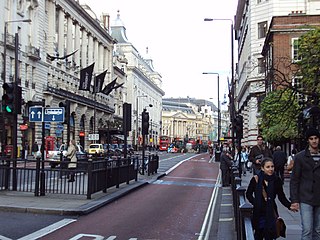
Piccadilly is a road in the City of Westminster, London, England, to the south of Mayfair, between Hyde Park Corner in the west and Piccadilly Circus in the east. It is part of the A4 road that connects central London to Hammersmith, Earl's Court, Heathrow Airport and the M4 motorway westward. St James's is to the south of the eastern section, while the western section is built up only on the northern side. Piccadilly is just under 1 mile (1.6 km) in length, and it is one of the widest and straightest streets in central London.

Bluestocking is a derogatory term for an educated, intellectual woman, originally a member of the 18th-century Blue Stockings Society from England led by the hostess and critic Elizabeth Montagu (1718–1800), the "Queen of the Blues", including Elizabeth Vesey (1715–1791), Hester Chapone (1727–1801) and the classicist Elizabeth Carter (1717–1806). In the following generation came Hester Lynch Piozzi (1741–1821), Hannah More (1745–1833) and Frances Burney (1752–1840). The term now more broadly applies to women who show interest in literary or intellectual matters.

Edmond Malone was an Irish barrister, Shakespearean scholar and editor of the works of William Shakespeare.

Colonel Richard Martin, was an Irish politician and campaigner against cruelty to animals. He was known as "Humanity Dick", a nickname bestowed on him by King George IV. He succeeded in getting the pioneering Cruel Treatment of Cattle Act 1822, nicknamed 'Martin's Act', passed into British law.
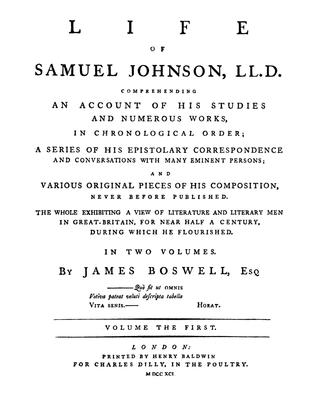
The Life of Samuel Johnson, LL.D. (1791) by James Boswell is a biography of English writer and literary critic Samuel Johnson. The work was from the beginning a universal critical and popular success, and represents a landmark in the development of the modern genre of biography. Many have called it the greatest biography written in English, one of the greatest biographies ever written, and among the greatest nonfiction books of all time. The book is valued as both an important source of information on Johnson and his times, as well as an important and enduring work of literature.
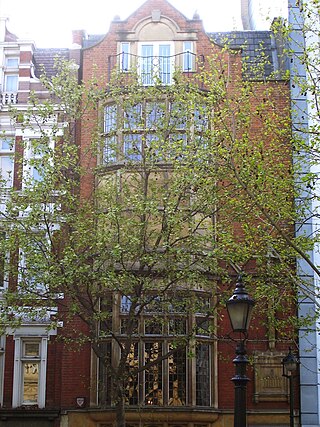
Beefsteak Club is the name or nickname of several 18th- and 19th-century male dining clubs in Britain and Australia that celebrated the beefsteak as a symbol of patriotic and often Whig concepts of liberty and prosperity.

The Club or Literary Club is a London dining club founded in February 1764 by the artist Joshua Reynolds and essayist Samuel Johnson.
The St Martin's Lane Academy, a precursor of the Royal Academy, was organised in 1735 by William Hogarth, from the circle of artists and designers who gathered at Slaughter's Coffee House at the upper end of St Martin's Lane, London. The artistic set that introduced the Rococo style to England was centred on "Old Slaughter's" and the drawing-classes at the St. Martin's Lane Academy were inextricably linked in the dissemination of new artistic ideas in England in the reigns of George II and George III.
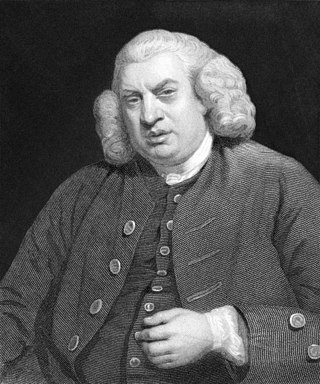
Robert Levet (1705–1782), a Yorkshireman who became a Parisian waiter, then garnered some training as an apothecary and moved to London, was eulogised by the poet Samuel Johnson, with whom Levet shared a friendship of thirty-six years, in Johnson's poem "On the Death of Dr. Robert Levet."
The Life of Samuel Johnson or Life of Samuel Johnson, LL. D. was written by John Hawkins in 1787. It was the first full biography of Samuel Johnson—with Thomas Tyers's A Biographical Sketch of Dr Samuel Johnson being the first short postmortem biography. Hawkins was a friend of Johnson's, but many in Johnson's circle did not like him. After Johnson's death, Hawkins was approached to produce a biography of Johnson and an edition of his works. His biography described Johnson's life, including previously unknown details about his writing career, but it was plagued by digressions into unrelated topics. Hawkins's Life of Samuel Johnson came under swift attack from critics, friends of Johnson's, and his literary rival, James Boswell immediately after its publication. Many of the critics attacked Hawkins for his lack of a strict focus on Johnson's life or for his unfavourable depiction of Johnson in various circumstances.
The religious views of Samuel Johnson are expressed in both his moralistic writings and his sermons.
Thomas Southwell, 2nd Baron Southwell PC (Ire), FRS, styled The Honourable from 1717 until 1720, was an Irish peer, politician and freemason.

Nando's was a coffee house in Fleet Street in London. It was known to exist in 1696, being the subject of a conveyance, and was popular in the 18th century, especially with the legal profession in the nearby courts and chambers.
Arthur MacLoughlin Broome was an English clergyman and campaigner for animal welfare. He was one of a group of creators of the Royal Society for the Prevention of Cruelty to Animals (RSPCA) in 1824. Broome was appointed as the original society's first Secretary, a post he held until 1828. He held posts at various churches in London, Essex, and Kent, and supported an appeal for earthquake relief in Syria. He wrote about animal theology and also about two 17th-century English clergy. He was guarantor for the RSPCA's debts, which led to his financial ruin and in April 1826 he was sent to a debtors' prison.















